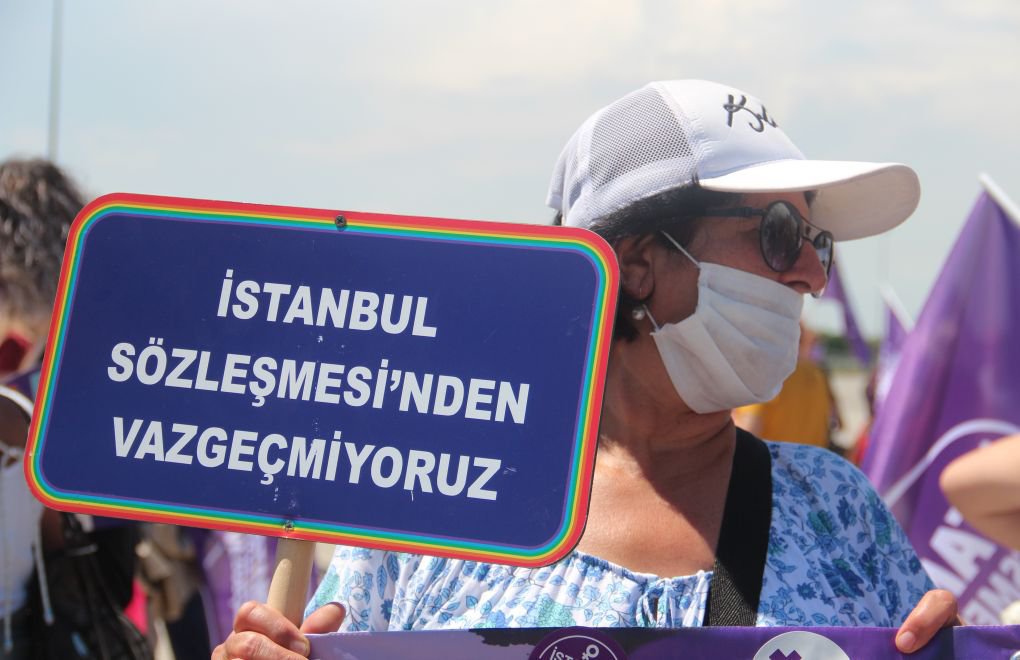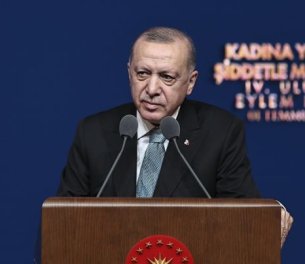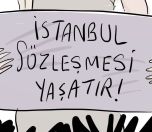"We don't give up on İstanbul Convention" - by Evrim Kepenek - bianet
Click to read the article in Turkish
Turkey has withdrawn from the the Council of Europe Convention on Preventing and Combating Violence Against Women and Domestic Violence - or the İstanbul Convention - by a Presidential decision issued by Justice and Development Party (AKP) Chair Recep Tayyip Erdoğan.
As of today (July 1), the Convention will no longer be in force in Turkey, according to the Article 80 of the Convention regarding denunciation.
Releasing a written statement within this context yesterday (June 30), Amnesty International said, "Turkey's withdrawal from the İstanbul Convention rallies the fight for women's rights across the world."
"Turkey's shameful withdrawal from the Istanbul Convention today will put millions of women and girls at greater risk of violence," said the organization:
President Erdoğan's announcement of the decision to quit the landmark treaty on preventing and combating violence against women and domestic violence will go down in history as the first time a Council of Europe member has withdrawn from an international human rights convention.
Amnesty International reminded the international community that "the move has drawn blanket condemnation from around the world and sparked nationwide protests in a country where domestic violence is prevalent and at least 300 women were murdered last year alone."
'A terrifying precedent setting the clock back'
Speaking about the issue, Amnesty International's Secretary General Agnès Callamard briefly said:
"At the stroke of midnight today, Turkey turned its back on the gold standard for the safety of women and girls. The withdrawal sends a reckless and dangerous message to perpetrators who abuse, maim and kill: that they can carry on doing so with impunity.
"Turkey has set the clock back ten years on women's rights and set a terrifying precedent. This deplorable decision has already become a rallying point for women's rights activists all over the world, and we must come together to resist further assaults on our rights.
'Extremely worrying development'
As indicated by Amnesty Internation, the Convention is a widely accepted human rights instrument to address rampant levels of violence against women in Europe. In June, Liechtenstein became the 34th country out of 47 in the Council of Europe to ratify it.
But the Convention is also facing a disturbing backlash across many parts of Europe and becoming a tool by several governments to spread misinformation and demonise gender equality, women's and LGBTI rights.
Amnesty International shared the following comment in this context:
"Turkey's withdrawal from the Istanbul Convention is an extremely worrying development amid an ongoing erosion of rights in the country.
"On 26 June, riot police used excessive force on Istanbul Pride marchers who saw the annual celebration of LGBTI rights be banned for the sixth consecutive year. Hundreds of Pride participants were subjected to tear gas and plastic bullets.
"At least 47 people were detained, including two minors and an AFP journalist who was subjected to torture or other ill treatment when several police officers restrained him on the ground. One officer knelt on his neck, severely restricting his ability to breathe."
'Tip of a dangerous anti-rights iceberg'
Agnès Callamard further commented:
"Turkey's withdrawal from the Istanbul Convention is the tip of a dangerous anti-rights iceberg. But it has also galvanized activists around the world to stand up for women's and LGBTI rights.
"In the months since President Erdoğan issued his decree, women in Turkey and beyond have been talking about the Convention more than ever and taking to the streets to defend what it stands for.
"The fight to uphold the human rights of all those impacted by the scourge of gender-based violence continues."
What happened?
Turkey has withdrawn from the İstanbul Convention with a Presidential decision published in the Official Gazette on March 20, 2021.
The decision in question said that "the Council of Europe Convention on Preventing and Combating Violence Against Women and Domestic Violence, which was signed by Turkey on May 11, 2011 and approved with the Cabinet Decree no. 2012/2816 on February 10, 2012, shall be terminated on the part of Turkey as per the Article 3 of the Presidential Decree no. 9."
Following this Presidential decision published at midnight, several social media users, women's rights defenders, lawyers and politicians, denounced the decision, recalling that the convention was unanimously approved at the Parliament and stressing that it is not possible for Turkey to withdraw from an international convention with a Presidential decision.
After the Presidential decision pulling Turkey out of the İstanbul Convention was met with criticisms and objections in both Turkey and around the world, the Communications Directorate of the Presidency released a written statement about the issue on March 22.
"As known, Turkey was the first signatory to the Istanbul Convention," the statement noted, arguing that the "İstanbul Convention, originally intended to promote women's rights, was hijacked by a group of people attempting to normalize homosexuality – which is incompatible with Turkey's social and family values. Hence the decision to withdraw."
The protests are still ongoing.
The 10th Chamber of the Council of State finalized the court cases demanding the stay of execution and annulment of the Presidential decision withdrawing Turkey from the İstanbul Convention ahead of July 1, when the İstanbul Convention will no longer be in force in Turkey, according to the Article 80 of the Convention regarding denunciation.
By a vote of three to two, the 10th Chamber of the Council of State has rejected the requests for the stay of execution and annulment of the Presidential decision, which has pulled Turkey out of the İstanbul Convention, or the Council of Europe Convention on Preventing and Combating Violence Against Women and Domestic Violence. (EMK/SD)









